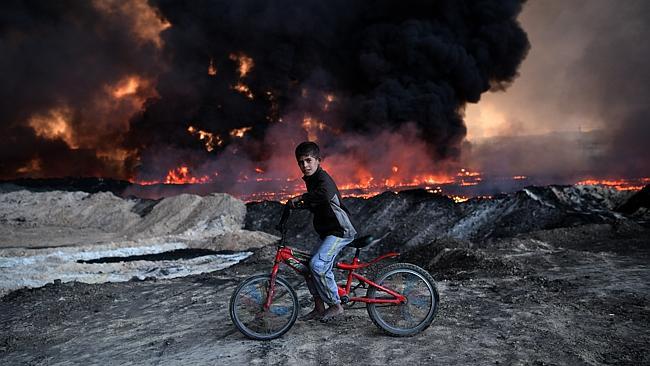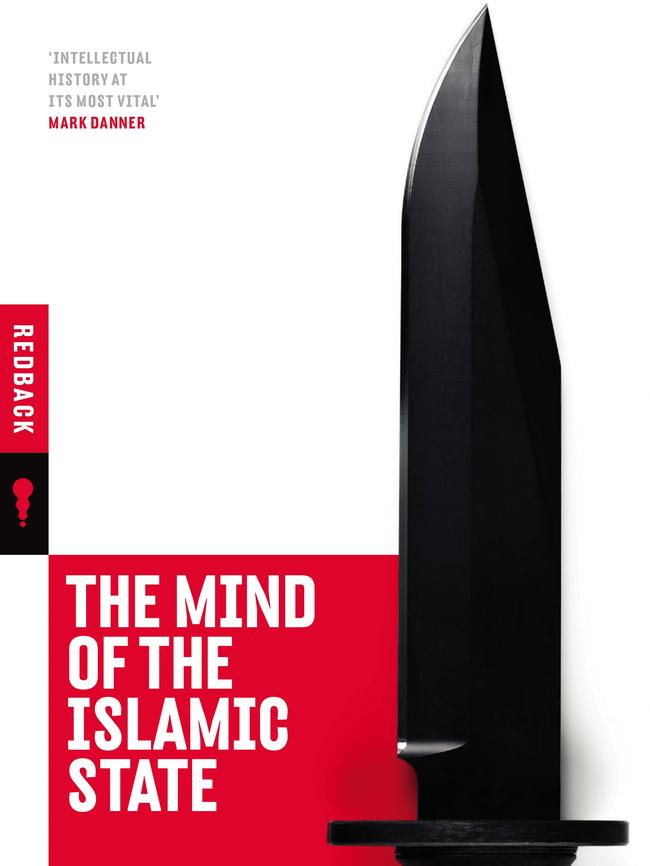Robert Manne’s Mind of the Islamic State deserves a wide audience
Robert Manne’s new book on Islamic State glosses over a fundamental problem with the Muslim religion.

The literature on the chaos in the Middle East, on Islam, jihad and terrorism, is vast. The recrimination, conspiracy theory and angry rhetoric that swirl around it threaten to spiral out of control. It is vital, therefore, that we find a way through without losing our bearings. Robert Manne has produced a beautifully crafted and lucid book on this problem. It deserves a wide readership.
I read The Mind of the Islamic State over two days. In between, I attended a concert by Fred Smith, a remarkable man who had several tours of duty with the Australian Defence Force in Afghanistan and emerged from it both sane and full of wry, touching, sometimes hilarious songs. He has not only written a deeply humane book about the experience, The Dust of Uruzgan (Allen & Unwin), but released an album under the same title. I recommend reading Manne and Smith together and also listening to Smith’s wonderful CD.

Of other recent books on Islamic State, several are sound and instructive: Fawaz Gerges’s ISIS: A History, Joby Warrick’s Black Flags: The Rise of ISIS, Jessica Stern and JM Berger’s ISIS: The State of Terror, Daniel Byman’s Al Qaeda, the Islamic State and the Global Jihadist Movement: What Everyone Needs to Know and Jay Sekulow’s Rise of ISIS: A Threat We Can’t Ignore.
The upheaval in Syria is so complex and awful that it is a conundrum all on its own. Two recent books by insightful first-hand observers throw its travail into a humanised perspective: Francesca Borri’s Syrian Dust: Reporting from the Heart of the Battle for Aleppo and Marwa al-Sabouni’s The Battle for Home: The Memoir of a Syrian Architect, which has a foreword by Roger Scruton.
Finally, Australia’s specialist on counter-insurgency and the pitfalls of the lengthening war against Islamic jihad, David Kilcullen, has contributed two substantial books in three years: Out of the Mountains: The Coming Age of the Urban Guerrilla (Scribe) and Blood Year: Islamic State and the Failures of the War on Terror (Black Inc). Kilcullen is a rare rapporteur on these matters. He is a former highly regarded military officer who left the army and went to the US to specialise in the theory of counter-insurgency and counter-terrorism. He worked in both Iraq and Washington, DC.
Manne’s contribution is among the best of these books. It is, almost certainly, the most challenging and important work he has done in a long career as a public intellectual. Uniquely, it traces the development of radical Islamist doctrine step by step through its key textual outputs, from Sayyid Qutb half a century ago to Dabiq, the organ of the horrifying, apocalyptic vision of the Islamic State in Iraq and Syria, which we have come to call ISIS.
Alongside this list of thoughtful and useful books, there are others that are abysmal. One of these is Malcolm Nance’s recent Defeating ISIS: Who They Are, How They Fight, What They Believe. His pivotal claim is that the raison d’etre of ISIS is nothing less than ‘‘to destroy Islam’’.
It is important this paradoxical claim be refuted, lest it add to the already endemic confusion about Islamic State. Not the least merit of Manne’s book is it shows in detail the relationship between Islamic State and traditional Muslim teaching on jihad, infidels and the apocalypse. His close analysis of these matters contrasts with Nance’s sloppy apologetics and textual vacuity. Several passages give away the poor understanding of history underlying Nance’s flimsy assertion that the mission of Islamic State is to destroy Islam. Here are two of them, from the heart of the book:
ISIS believes that it is carrying out a chain of events as prophesied by the Prophet Mohammed. All components of their belief system enjoins the words in the Qur’an, but instead of interpreting it the way that it has been for the past fourteen centuries, they took another direction …
The Cult of Jihad now led by ISIS and a close second al-Qaeda seek nothing less than the seizure, dismantling and destruction of the entirety of Islamic thought, culture, jurisprudence and tradition since 632 [when Mohammed died]. All of those centuries of tolerance, discovery and compromise with the rest of the world are weaknesses to be ruthlessly eliminated. To them, little of Islam can be salvaged — the Muslim world is going to have to be burned to the ground to be saved for God.
He makes these assertions without at any point attempting to substantiate them. The beauty of Manne’s book is that he takes us through the debates over jihad and the end times within the Sunni jihadist movement throughout the past half century and delineates, with often exquisite precision, the cleavages in doctrine and scriptural interpretation that have produced the genocidal propaganda and cruel barbarities of Islamic State.
Very early in the book, Manne remarks:
Like all Jews of my generation, I grew up under the shadow of the Holocaust. As an undergraduate, I had been invited to review Norman Cohn’s Warrant for Genocide, a history of The Protocols of the Elders of Zion, a supposedly authentic document that purported to reveal the secret Jewish war plan for world domination.
In the seven chapters of his book, Manne reviews, as it were, a set of works that, each in its own way, urged that true Islam requires that Muslims collectively and individually have a moral duty to engage in jihad against both ‘‘apostate’’ Muslim regimes and against all infidels, until all the world is Islamic.
These works are Sayyid Qutb’s Milestones (1964); Mohammed Abd al-Salam Faraj’s The Neglected Duty (1980); Abdullah Azzam’s Join the Caravan (1987); Ayman al-Zawahiri’s Knights Under the Prophet’s Banner (2001); Abu Bakr Naji’s The Management of Savagery (2004); and the serial publication, from 2014, of the ISIS journal Dabiq, which Manne describes as ‘‘an elegant and glossy official online magazine in several languages … self-evidently written by intellectuals steeped in the theological tradition of Islam, with a deep knowledge of the Qur’an, the hadith and major Islamic scholars’’.
The lucidity, historical sensitivity and textual interpretation that Manne lays before us across this dark evolution of insurgent Muslim thought are impressive. They lead us, as he himself concludes, from the systematic and sophisticated dogmatism of Sayyid Qutb — a kind of Islamic John Calvin — to ‘‘the Gates of Hell’’. Anyone seeking to engage thoughtfully, rather than merely fearfully or angrily, with this body of work will benefit from reading The Mind of the Islamic State.
Given that Manne is Jewish and lives, as he writes, in the shadow of the Holocaust, his restraint in this piece of work, the care with which he picks his way through the darkening landscape, is admirable. The book is not a polemic; not even against the Islamic State. It is a work of moral and intellectual distinction, because it parses grim debates with close reading, fine discrimination and nuanced evaluation.
There is a lacuna, however, in Manne’s reflections. Between the lines, we can see how those whose books of the past half century he has read and thoughtfully analysed, point back to the deep roots of jihad in Mohammed’s own practice, in the Koran and in the earliest epoch of Islam, as well as in the 14th century, after the Mongol destruction of the Abbasid caliphate. As he observes, Sayyid Qutb understood that ‘‘the Qur’an delivers its secrets only to those whose frame of mind has been shaped in battle’’.
In short, the one God of Islam is not the God of Abraham, of Micah, of Isaiah — or of Jesus. Mohammed’s deity is a god of war and conquest and the Sunnah, the example of the prophet, is one of jihad and the killing of one’s enemies and critics. Manne does not address this fundamental problem.
Islam did not arise or spread by peace or persuasion, nor did Mohammed preach that it should do so. It arose as a religion calling for the violent overthrow of all non-Muslim religions and principalities, in order that the ‘‘truth’’ might prevail. For several centuries, its adherents strove by all means at their disposal to conquer the whole of Europe and Asia. The much criticised Crusades were a belated and relatively small-scale response to these wars of conquest.
The Ottomans renewed those wars of conquest and took Constantinople, Greece and the Balkans. Modern jihadists, including Hassan al-Banna, founder of the Muslim Brotherhood, decades before Sayyid Qutb wrote Milestones, sought to revive this tradition of Muslim militancy. It is very active now in many parts of the Muslim world and by no means confined to that vicious enclave that calls itself the Islamic State.
This is the larger problem. Sayyid Qutb’s masterwork was In the Shade of the Qur’an (1954). Those who insist that Islamic State is an aberrant form of Islam and its rise the fault of the West must reckon with the fact ‘‘the shade of the Qur’an’’ is the complacent but dangerous assumption that Islam is the ‘‘final revelation’’ and that sooner or later the world must and will become Muslim — through jihad and as the ‘‘will of Allah’’. If you are reading Manne’s book closely, you will perceive this between the lines — but it is not directly stated or addressed. It needs to be.
Paul Monk is a former senior intelligence analyst and author of The West in a Nutshell: Foundations, Fragilities, Futures.
The Mind of the Islamic State
By Robert Manne
Redback, 192pp, $22.99




To join the conversation, please log in. Don't have an account? Register
Join the conversation, you are commenting as Logout